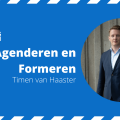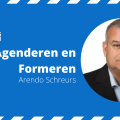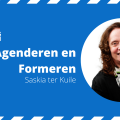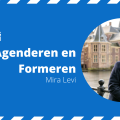In our interview series “Planning and Forming” we speak to experts from various sectors about the issues in their sector, the ways in which they are trying to put them on the agenda in the upcoming coalition agreement and their view of the new House of Representatives. This edition we speak to Jaap Jelle Feenstra
Jaap Jelle Feenstra is Public Affairs Officer at the Port of Rotterdam Authority. The port is the largest seaport in Europe, generates an added value of 46 billion euros, which is 6.2% of GDP and provides approximately 385,000 direct and indirect jobs at companies in the Netherlands.
Were you satisfied with the election results?
As a lobbyist, the election results are the new reality and therefore the foundation on which you will start building again. So the final result doesn't really matter to me professionally.
What I do worry about is the fragmentation in politics. Party-political marketing offers a specific party for each segment, target group and theme. And fragmentation through a split from an existing party is not fair to new parties without having independently achieved the electoral quota, which is also not fair to new parties, which must first achieve the electoral quota independently without influence, subsidy and airtime.
What are the most important issues for your sector?
There are a number of issues that are important for our sector:
First of all, the sustainability of transport and industry and thus also the public appreciation for the manufacturing industry. Transport was discussed a lot in the election manifestos, but the attention paid to the preservation, expansion and sustainability of the industry lagged behind. This is an important point, as half of the port complex consists of transport, but the other half is mainly industrial.
But investments in infrastructure are also important. There is too little political attention for the timely development of infrastructure, even though this is very important. This concerns both the connection between the Randstad and the region, but also the upgrading of the required energy infrastructure and the cross-border development of pipeline networks.
The issues are mentioned in most party programmes. The impetus is there, but the concrete and consistent, well-thought-out approach is often missing, while the realization is determined by spatial reservations and collaboration in public-private financing. Moreover, there is an underappreciation of the important topics. We talk more often about Hugo de Jonge's shoes than about what we will base our prosperity on in 10 years' time.
In what ways have you tried to incorporate these issues into politics?
At the Port of Rotterdam Authority, we have presented the political parties with our general preconditions: a workable nitrogen policy must be introduced and a level playing field is needed for internationally active companies.
For the nitrogen approach, we also approached the media and had discussions with politicians and with the departments of EZK, IenW and LNV. And we are actively in contact with companies in the agricultural sector.
The level playing field is important for the investment and business climate. The Netherlands should not tighten EU obligations nationally. If the EC sets up an EU-wide Green Deal for climate policy with an EU-wide tightening of the ETS, then a proposal for a national CO2 tax should be included in that and not added on top.
“Sustainability requires a multi-year stable perspective, which we must maintain and continue, with concrete plans and structural financing.”
What should remain the same for the next 4 years?
Sustainability requires a multi-year stable perspective, which we must maintain and continue, with concrete plans and structural financing.
What needs to change in the next 4 years?
We must dare to invest. By investing now in energy infrastructure and sufficient capacity of the electricity grid, we can keep the future society running. This requires spatial reservations and long-term planning in favor of sustainability and safeguarding our future earning capacity. The ambitions are exciting and big, they must be translated into very consistently how we are going to realize this in a public-private context. The implementation-oriented approach must be central.
“We must dare to invest. By investing now in energy infrastructure and sufficient electricity grid capacity, we can keep the future society running.”
Do you think your sector is well represented in the House of Representatives?
What an MP does not know about the sector depends on the sector. That is my starting point. A Member of Parliament is not going to be a super expert on dozens of topics, which is precisely why being open to and providing information is crucial. As a sector, it is important to share your knowledge with the Member of Parliament responsible for this. As the Port of Rotterdam Authority, we like to share our knowledge and we hope that the Chamber is enthusiastic about our sector and the opportunities that the Rotterdam cluster offers for innovation, sustainability and added value for the Netherlands.
Would you like to know more about how Jaap Jelle approaches politics? And would you like to receive some practical tips about this? Listen to the podcast In The Lobby.





